
foreword | Historical Narratives | Resources | Links | Contact
REMEMBER THE REDCOATS [*]
History is the saga of soldiers.
[Thousands of soldiers from the British Isles
lie buried in unknown graves in the New World.]
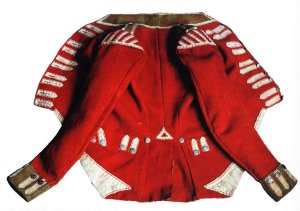 |
"On the idle hill of summer,
Sleepy with the sound of streams
Far I hear the steady drummer,
Drumming like a noise in dreams.
Far and near and low and louder,
On the roads of earth go by,
Dear to friends and food for powder,
Soldiers marching, all to die."
The Shropshire Lad, XXXV
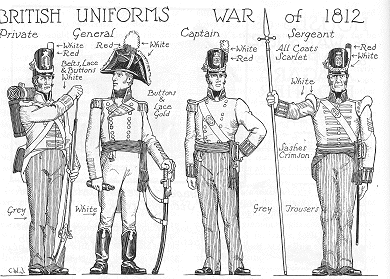 |
|
British Infantry Mission Statement: CLOSE WITH AND DESTROY THE ENEMY |
The name and fame of Sir Isaac Brock are well known to Canadians, but few know the names of the British regiments whose constancy and courage really kept Canada from becoming part of the United States. Far from home, family and friends, courageous British regulars fought and died in the remote, isolated part of the world that is our country.
They came three thousand miles and died,
To keep the past upon its throne;
Unheard, beyond the ocean tide,
Their English Mother made her moan.[**]
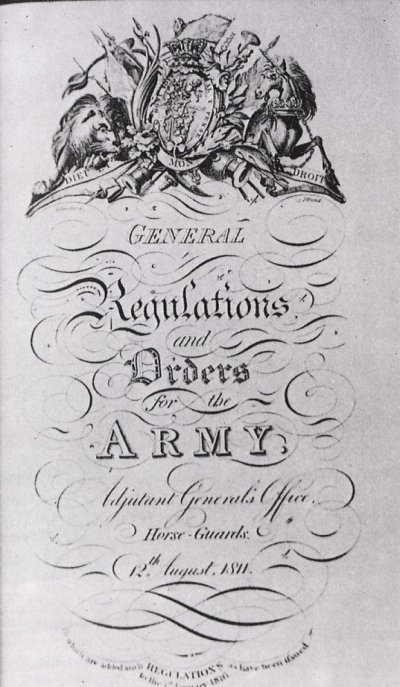 |
|
Title Page of British Army Regulations |
Regiments of the line were ordinary regiments numbered 1 through 70. Cavalry regiments were numbered 1 through 18. Some regiments had names as well as numbers. The strength of a regiment was 477. An ordinary regiment was composed of one battalion organized into 10 companies. Each company contained 38 privates. Of the 10 companies, one consisted of grenadiers and another of light infantry. When grenadiers were introduced into the regiment in 1677 the function of a grenadier was to hurl hand-grenades among the enemies' ranks at close quarters. The size and weight of these missiles required the throwers to be tall and muscular. By 1775 grenades disappeared but grenadiers remained and they represented in height and strength the finest of each regiment. Light infantry was introduced shortly before the American Revolution to provide each regiment with a corps of skirmishers. Good marksmen, light build and active temperament were required for this service. The grenadiers and light infantrymen became the picked men of the regiment and because of this they were placed on the flanks and became known as the 'flank companies.'
According to E.A. Cruickshank, when war broke out in 1812, the following British regiments were in Canada and the Maritimes:
-375 officers and men of the Royal Regiment of Artillery;
-31st Royal Artillery Drivers;
-3 Royal Engineers;
-10th Royal Veteran Battalion;
-8th (1st Battalion);
-49th, 100th, 103rd, 104th, Regiments of Foot;
-Royal Newfoundland Regiment;
-Canadian Fencibles;
-Glengarry Light Infantry;
-Canadian Voltigeurs
In Britain during the late 18th and early 19th centuries, prejudice against the army was almost universal. There was no police force and the strong arm of the law was represented by companies of red-coats whose discipline, behaviour and pay were, even by the standards of those days, deplorable. "The army," said a Prussian general, "mirrors the people from which it is drawn." The military's mentality towards those in the ranks reflected the contempt civilian society displayed towards those of "the lower orders,"the strata from which most of the soldiers were recruited. The ranks were filled with the roughest types because the hard environments from which these individuals came bred hard men. Many were enlisted as an alternative to punishment for crimes committed. They were men of the underworld, the criminals, pickpockets, poachers, smugglers, bully-boys and thugs, who if not on the run, had been caught, convicted and offered a choice between death, jail or the army.
"This day received a letter from General Smith, the High Sheriff of Berks, desiring me to inform you of the Names of several Convicts who had received Sentence of Death but were pardoned on Condition of entering the Service.
- "John Quinn an Irish American 29 years of Age near six feet high, very dirty and ragged and seeminly of slow understanding was convicted of Orchard Robbery. He is willing to serve as a soldier.
-Robert Thacher received Sentence of Death for a Highway Robbery as did William Hughes for Sheep and Horse Stealing and William Marriott and William Abby for Horse Stealing but were pardoned as exceedingly proper Fellows either for the Land or Sea Service."
Every effort was made to entice men into the military and how better to stimulate interest in military life than "by Beat of Drum" when authorized by the King as follows.
G.R.
These are to authorize you by beat of drum or othewise to raise so many volunteers in any county or part of our kingdom of Great Britain as are or shall be wanting to recruit and fill up the respective companies of our ____ regiment of foot under your command to the number allowed upon the establishment....
Given at our Court at St. James the ___ day of ___17__ in the year of Our reign.
By His Majesty's command.
Prospects were drawn to the recruiting teams that travelled throughout the countryside. Recruiting parties in colourful military uniforms were composed of an officer, a sergeant, a corporal, a drummer and one or more privates. They set up in some prominent place to go into their act. The drummer attracted enthralled onlookers by beating "the points of war," with some fancy stick-clicking thrown in for good measure. Unencumbered by scruples the officer looked the other way as a sergeant with the gift of the gab duped the gullible.
Villagers unfamiliar with the world outside were held spellbound by his tall tales of a life of adventure and the unrivalled opportunities to be had by volunteering for their regiment. He promised all the brave fellows who dared don the "sovereign's suit" nothing but excitement, travel, riches and glory. "It was all about Gentlemen soldiers, merry life, muskets rattling, cannon roaring, drums beating, colour flying, regiments charging and shouts of victory! Victory!"
Entranced by the sound, the colours and the con job, wide-eyed young men crowded into the nearest pub where after downing a few mugs of ale and with the King's shilling burning a hole in their pockets, the ensnared recruits suddenly found themselves marching to the beat of the drum.Most recruits were young men, frequently teenagers who pictured themselves in a splendid uniform which would impress the girls. "The better you dress a soldier the more highly will he be thought of by women and consequently by himself."
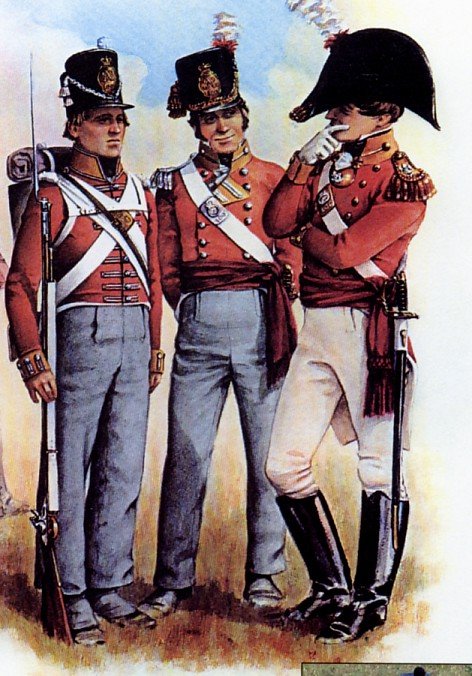 |
|
The Redcoats |
The prospect of this never failed to fascinate. It conjured up a romantic picture of soldiering which was the goal of every recruiting sergeant. The young men were not necessarily all na´ve, but they were attracted by a vision more exciting than the fate that faced them: labouring from dawn to dusk for the rest of their lives in the village where they were born.
For a good many of them the prospect of regular food, shelter, pay and companionship proved equally great. They entered the service to escape unemployment and starvation and for the prospect of a better or at least a more exciting life. Recruits were frequently found in the poor-houses where lads aged 12 to 16 were prime candidates. The army's appeal to the hopelessly destitute was obvious. What did they have to lose? The prospect of death on the battlefield figured little to a starving man with no prospects of employment at home versus travel and a colourful career in the army. Despite its rigors and raw discipline, the military was more to their liking than the life they led at home.
On occasion when recruits were badly needed, men were simply impressed into service by press gangs, an unpopular practice that few favoured but which was justified solely by reason of "the safety of the state."
According to the 1756 Act, those liable for 'pressing' were defined as "such able-bodied men as do not follow or exercise any lawful calling or employment or have nto some other lawful and sufficient support and maintenance." Press gangs were accustomed to seize their prey without much regard for law or justice. Army press gangs fought with navy press gangs for recruits and the recruits fought with both for their freedom. Many in order to incapacitate themselves cut off the thumb or forefinger of the right hand. Others deserted at the first opportunity. In the words of one officer, they were "a mighty slippery set of fellows," who had to be kept under lock and key until they were shipped off to America or other foreign locations. Technically they should not be under seventeen nor over forty nor under five feet four inches tall.This is an account of one individual accosted by a naval press gang. "I was crossing Towerhill when I was accosted by a person in a seaman's dress who tapped me on the shoulder and inquired in a familiar and technical strain, 'What ship?' I assumed an air of gravity and surprise and told him I presumed he was under some mistake as I was not connected with any shipping. The fellow gave a whistle and in a moment I was in the hands of six or eight ruffians who I immediately dreaded and soon found to be a press gang."
Despite their often horrific histories, these same men served with great resolve and bravery. Why? Their dedication is all the more difficult to understand given the harsh lives they lived and the often brutal discipline to which they were subjected. Even Britain' greatest soldier, the Duke of Wellington, who owed his famous victories to their valour, referred to his men as the "scum of the earth." By this he meant the men who entered the army but from this scum came soldiers that "drove him to despair on occasions, moved him to tears and astonished him with their bravery." His secret for success: "Pay well; command well; hang well. Contempt for the army was shared by Wellington's own mother who believed her young son "with his sorry record" was unsuited for any occupation but the army. Her comment when he decided to attend the military academy: "He is food for powder and nothing more."
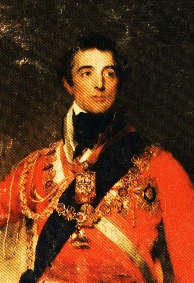 |
|
Arthur Wellesley, Duke of Wellington |
Promotion to commands high or low were awarded by money not merit.The system of buying and selling commissions despite repeated attempts to suppress it remained in effect. Commissions were expensive. Regimental officers - lieutenants, captains and majors - came from the middle ranks of society. Higher officers - major generals, lieutenant generals, generals - came from nobility, for example, Howe, Gage, Burgoyne and Clinton - "belonged to ancient enobled families."
Looting, drinking and desertion were widespread among the soldiers who were treated more like serfs than citizens bearing arms for their country. Desertions occurred not only because of the strict discipline men were forced to endure, but also because of boredom, bad food, low pay and little leave. Wretched conditions gave military service a bad name and made recruiting very difficult.
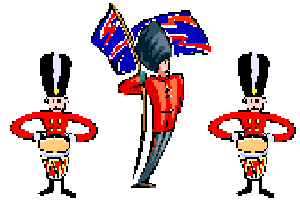 |
When recruits were needed for the American War (War of 1812), the writer of this recruitment poster outdid himself to attract men into the Royal Marines. Needless to say actual life experiences did not always live up to the persuasive prose.
AMERICAN WAR
What a Brilliant Prospect does this Event hold out to every Lad of Spirit, who is inclined to try his Fortune in that highly renowned Corps, The Royal Marines. What an enviable Station must the ROYAL MARINE hold,--- who has the benefit of liberal Pay, and plenty of the best Provisions, with a good and well appointed Ship under him, the Pride and Glory of Old England; surely every Man of Spirit must blush to remain at Home in Inactivity and Indolence when his Country and the best of Kings needs his Assistance. Where then can he have such a fair opportunity of reaping Glory and Riches in the midst of Honour and Glory, surrounded by a set of fine Fellows. Know that while he scours the Ocean to protect the Liberty of Old England, that the Hearts and good Wishes of the whole BRITISH NATION attend him; pray for his Success, and participate in his Glory!!
Lose no time then my Fine Fellows in embracing the Glorious Opportunity that awaits you; YOU WILL RECEIVE: Sixteen Guineas Bounty and on your Arrival at Head Quarters be comfortably and genteely CLOTHED. Take courage then, seize the Fortune that awaits you, repair to the ROYAL MARINE RENDEZVOUS Long live the King, and Success to his Royal Marines.
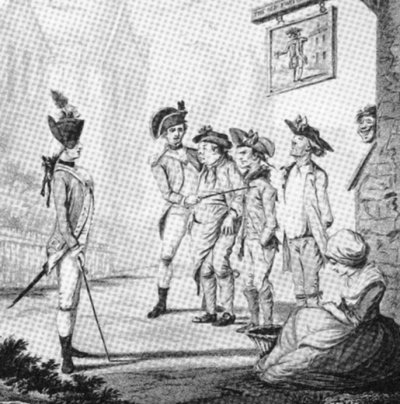 |
|
Raw Recruits about to be shipped off to ports unknown. 1770 |
The Daily Allowance of a Marine when embarked was:
-- One Pound of BEEF or PORK;
-- One Pound of BREAD, Flour, Raisins. Butter. Cheese. Oatmeal Molasses, Tea, Sugar, etc.;
-- And a Pint of the best WINE together with a Pint of LEMONADE.
-- In warm Countries they had a plentiful allowance of the choicest FRUIT.
"And what can be more handsome than the Royal Marine Proportion of PRIZE MONEY, when a Sergeant shares equal with the First Class of Petty Officers, such as Midshipmen, Assistant Surgeons, etc. which is Five Shares each; a Corporal with the Second Class, which is Three Shares each; and the Private with the Able Seamen, One Share and a Half each."
The Bringer of a Recruit received THREE GUINEAS.
British soldiers plied their deadly trade with the Brown Bess, the affectionate nickname of the British service smooth-bore, flintlock musket with a priming pan, three feet eight inches long in the barrel and weighing fourteen pounds. Recruits were subjected to arms drill with this basic infantry weapon, which painted the face of battle during the period 173-1815. Through endless repetition the procedures necessary to load and fire a musket the soldier became an extension of his gun. Troops were taught to fire fast. Aiming was not encouraged. The heavy flintlock Brown Bess was the standard musket of the British soldier in the colonial wars, but it was used well into the 19th century.
 |
|
Brown Bess |
Commonly called the Brown Bess after the first matchlock guns introduced into the British army at the time of Queen Elizabeth I, their barrels and metal fittings having been browned. Later these became steel-bright. The earliest known example of its use was in the Tower of London. It weighed five kilograms and was a muzzle-loader that fired a .73 calibre lead ball. The .05-inch space or "windage" between the ball and the barrel was crucial to fast loading. While the bullet could simply be dropped down the muzzle, it severely limited the gun's accuracy. When Bess was fired the ball rattled up the barrel, its final direction determined by the last side of the barrel it hit before hurtling out of the barrel. At short range this deflection had only a minor effect. One could hit a foot-square target at forty yards almost every time. Beyond this range results worsened quickly. An officer wrote in 1814 that "as for firing at a man at 200 yards with a musket, you might as well fire at the moon." Added to its inadequacy was the fact that the Bess possessed less than rudimentary sighting devices. This short-coming was compounded by the amost impenetrable smoke cloud produced by a force of several men shooting volley after volley.
A musket had a life expectancy of 8 to 10 years, its barrel frequently wearing out by frequent rubbing with red, brick-dust that produced a pleasing shine but removed the metal rendering it liable to burst. Worse still the catch against which the hammer engaged became dangerously worn so that muskets went off when only part-way retracted and when it was supposedly safe.
The missile, a round leaden bullet weighing about an ounce, was wrapped in a stout paper cartridge. Even at its best the musket presented problems for soldiers. A basic requirement of all recruits was that they have two opposing teeth. The reason: two opposing teeth were needed because the soldier had to bite open a paper cartridge. With the musket at half-cock, the soldier bit open the cartridge and dribbled some of its powder into the weapon's flash pan which he then closed by moving the steel backwards. The remainder of the powder was poured into the muzzle on top of the bullet. Then wadding was inserted and the paper cartridge, the ball and the wadding were rammed home. When the hammer of the weapon was drawn all the way back, the soldier pulled the trigger. Sparks produced by the impact ignited the powder in the pan which set off the main charge with a roar much like a modern shotgun.
 |
Marksmanship with most regiments was poor which was understandable given that little attention was paid to target practice. Soldiers did not aim at anything in particular and this accounted for the saying that it took a man's weight in bullets to kill him. It was only later that conditions gave rise to the sharpshooter, a man who not only fired his musket but aimed it at something or somebody. The bayonet in the beginning was more of a defensive weapon used to keep attackers away as soldiers re-loaded their rifles. Bayonet charges were usually ordered only after the enemy line had been brought to the breaking point by the gunfire. However, officers who were trained in the school of European warfare placed more reliance on the bayonet than the bullet. General Johnny Burgoyne favoured the bayonet's use and in his directions to the troops he said, "Men of half your bodily strength and even cowards may be your match in firing but the onset of bayonets in the hands of a valiant is irresistible." While Burgoyne praised the bravery of his men after one battle, he lamented, "The mistake they are still making is preferring firing to the bayonotte."
A soldier was taught "to point his weapon horizontally, brace himself for a vicious recoil and pull a ten pound trigger till his gun went off if indeed it did go off when the hammer fell." The inherently inaccurate weapon had an effective range of three hundred yards, but its accuracy was unreliable at any distance greater than forty or fifty yards. Each soldiers carried 60 rounds of ammunition but the greatest part of these were expended in vain. It was estimated that only one 1 in 200 took effect. The rate for a rifle was 1 in 20.
The musket's range was very short hence its effectiveness depended on a mass of men firing at close range where the rapidity of fire and fortitude of the firers were of critical importance. Although twelve separate motions were required in using the Brown Bess, in the hands of well-disciplined troops the musket could be loaded and fired at a rate of three to four shots per minute. However, the average soldier fired only two or three rounds per minute. A battle line four ranks deep could deliver about fifteen full volleys per minute, a rate no other army could match. Men often put in powder and ball without ramming and the effect was slight. Rapid firing was not considered necessary by some officers. Wolfe wrote, "There is no necessity for firing very fast; a cool, well-levelled fire with pieces carefully loaded is more destructive and formiddable than the quickest fire in confusion." The three-sided bayonet which weighed a little over a pound and was fourteen inches in length did not improve accuracy when it was attached to the muzzle.
Aside from their clumsiness, the firearms of the period had another serious drawback: their efficiency depended on the weather. A high wind might blow the powder out of the pan. Rain might wash the powder out of the pan, change the powder to paste or dampen it and render every shot a misfire. More than one encounter was called off because of rain. On one occasion during the revolution a violent wind and rain storm arose, the firelocks were rendered useless and the two forces separated. When the musket did fire it enveloped the soldiers in smoke which often in battle became so thick it created a cloud which prevented the men from seeing much more than the red flashes of their own muskets. Troops were also trained to load and fire the less accurate, shorter-range musket two or three times a minute. "Standing shoulder to shoulder, all on the word 'volley' fired at once," then they charged with bayonet through the choking clouds of musket smoke which completely obscured their vision. Officers did not worry much about the weapon's shortcomings. Although most shots missed, the infernal chocking smoke, the concussive sound and the grisly effects on any unlucky target were sufficient.
The sword was the weapon of choice for many officers, but some preferred spontoons or half pikes. Sergeants carried halberds which were about seven feet in length amd had a crosspiece near the point to prevent over penetration after a thrust. The forested countryside in North America induced many to discard these awkward medieval weapons and replace them with firelocks, a gun with a slow match to ignite the powder charge. Some officers carried fusils, a light flintlock musket.
The troops were dressed in a tight-fitting uniform that included a stiff leather stock at the throat to keep one's head erect. Hung about the belt were various bits of encumbering equipment including a canteen, a cartridge box for the musket, a bayonet, a haversack to hold bread and cheese, the virtually inedible biscuit called hardtack and a backpack for spare items such as shoes, socks and blankets.
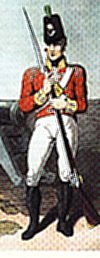 |
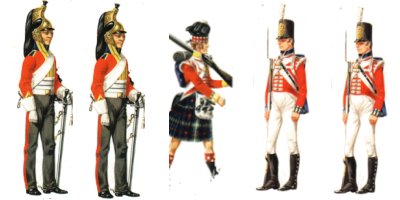 |
If a soldier were wounded he was lucky to survive for wounds quickly became infected. An injured limb was usually simply sawed off - without anesthetics. Death from diseases accounted for many more men than death in battle. The pay of a private was 8 pence a day, most of which went for subsistence. Some was spent on clothing, medicine and repairs to his arms and the rest was deducted by the government. Food ranged from poor to appalling and soldiers were often underfed and scarcely able to endure the drill that made them into amazingly good soldiers.
Men of "higher calibre" never considered enlisting because of the degrading punishments that were part of every soldier's existence. During campaigns in Europe halyards were regularly erected along the route of march where floggings were administered early each morning. These beatings were so severe they frightened the foreigners who looked on in amazement at the savagery of British military rule. Even in the middle of the 19th century, Florence Nightingale's efforts to humanize treatment of sick and wounded soldiers were scorned, ridiculed and even resisted by some of the same officers who had led the men into battle.
What made these men serve and earn such undying fame as the "thin red line"? Their courage and constancy were attributed largely to pride and regard for the regiment in which they served which meant the men who comprised it. They fought because of comradely competition, gutter-fighter toughness and regimental pride. "Courage goes much by opinion and many a man behaved as a hero or coward according to how he is expected to behave."
Brave leadership was another motivating factor. "Ten soldiers wisely led will be a hundred without a head." [***] Officers were expected to lead with demonstrative courage. "The words 'go on' did not become an officer." 'Come on' did. A real leader told the men what to do and led them to do it. "A piece of spaghetti or a military unit can only be led from the front end." "It is indeed curious how a man loses or gains standing with his comrades in the field. Officers, too, were commented on and closely observed. Troops were proud of leaders who were brave in the field and loyal to those who were kind and considerate of them.
The maintenance of morale cannot be over-emphasized. Brock's triumph over Hull at Detroit was in great part due to superior morale which was mainly the result of bold and effective leadership. "High morale is a pearl of very great price and the surest way to obtain it is by success in battle."
If charismatic leadership was one key ingredient of morale, vigorous paternalism was another. In spite of Wellington's comment about the baseness of men in the ranks, he won their loyalty and allegiance because he was a humanitarian as well as a disciplinarian. He displayed concern for his soldiers' well-being and regularly pressed for promotion based on merit. Successful officers combined discipline with solicitude for their men. Early in his career General James Wolfe ordered his officers
In His Own Words
"to attend to the looks of the men and if any are thinner or paler than usual, determine the reasons and take proper means to restore them."
Some of Wolfe's officers scoffed at their new major's methods but they were gloriously vindicated on the Plains of Abraham. Discipline got men into battle, helped hold them steady in rank and file and often stopped them from deserting. The lash, noose and firing squad had their limitations on the battlefield. What motivated men more in the smoky world of combat and killing was a sense of respect, admiration and esteem for their regiment and its leader. Wolfe's presence always inspired bull dog courage and go-ahead bravery because men knew he could be counted upon. They were inspired by his fortitude in the face of danger.
Isaac Brock was another such leader. He preached and practised care for the common soldier and believed that kindness fostered commitment. When soldiers knew their well-being was uppermost in the mind of their leader, they responded with loyalty and frequently fought with boldness and bravery considerably beyond the call of duty. In 1797 when Lieutenant-Colonel Isaac Brock assumed senior command of the 49th Regiment, he found a regiment lacking in drill and discipline and perilously close to mutiny. His successful efforts to change them earned him the praise of the Duke of York, Commander-in-Chief of the British Army, who declared that from one of the worst regiments in the service Brock had created one of the best. The 49th Regiment subsequently served at the battle of Egmont-op-Zee, where the regiment was heavily and impressively engaged. Brock was full of praise for the men following the battle.
In His Own Words"Nothing could exceed the gallantry of the 49th and no commanding officer could have been more handsomely supported than I was by the glorious 49th."
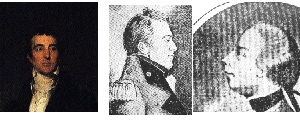 |
|
Wellington; Brock; Wolfe |
Another esteemed leader was Lieutenant-general 'Gentleman Johnny' Burgoyne. He was known as 'the soldiers' friend' and much loved by them because of his concern for their welfare.
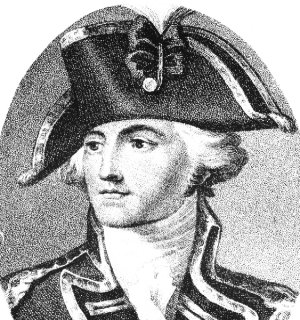 |
|
'Gentleman Johnny' Burgoyne |
"The failure of British arms in the American revolution cannot be ascribed to want of courage on the part of officers and men. No braver troops ever shed their blood for the flag of England than those who three times charged up Bunker Hill in the face of withering fire or attacked American lines at Saratoga. Failure was due partly to inept generalship, partly to natural difficulties and partly to poor and very inept military administration."
The Soldier's Return
When wild war's deadly blast was blown,
And gentle peace returning,
With' many a sweet babe fatherless
And many a widow mourning.
I left the lines and tented field,
Where long I'd been a lodger,
My humble knapsack all my wealth,
A poor but honest soldier.
For gold the merchant ploughs the main,
The farmer ploughs the manor,
But glory is the soldier's prize,
The soldier's wealth is honour.
The poor brave soldier ne'er despise
Nor count him as a stranger,
Remember he's his country's stay
In day and hour of danger.
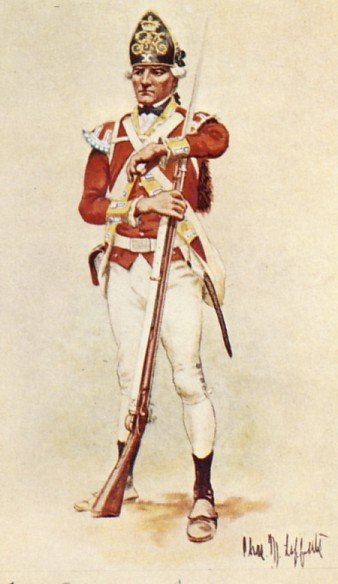 |
|
Private of Light Infantry, 10th Regiment of Foot 1775 (9) |
[*] Various attempts have been made to explain the origin of the red coat. One suggestion was that it hid the blood. The red coat was first introduced into the British army as the uniform of the New Model Army in 1644-45. Why was red selected as the parliamentary colour? It seems strange that the Puritans, who controlled parliament at the time and who were noted for their plain and sombre attire should choose scarlet for their soldiers. It may have resulted from the fact that red was the colour of the uniform of the King's bodyguard, but this too is strange since Parliament and the King were not on the best of terms during this period. In fact, Charles I literally lost his head by opposing parliament.
The New Model Army was one of several parliamentary armies which played an important role in the English Civil Wars. Organized by parliament early in 1645 it was formed initially from existing armies but composed solely with a view to military efficiency and competency. It rapidly became a national army, recruited country-wide and not from any one locality. Unlike the soldiers who formed almost all previous armies, Oliver Cromwell's soldiers were composed of persons superior to the multitude in station and education. These persons, sober, moral, diligent and accustomed to reflect, had been induced to take up arms not by the pressure of want, not by love of novelty and license, not by the arts of the recruiting officer but by religious and political zeal. This army acquired a reputation for firm discipline and high morale. Promotion was by merit and because of one's religious and political radicalism. This change was as a consequence of its victorious record and the personal influence of Cromwell who eventually became its leader.
[**] Inscription on the grave of the Redcoats who fell at Concord Bridge. [***] EuripidesCopyright © 2013 Website Administrator